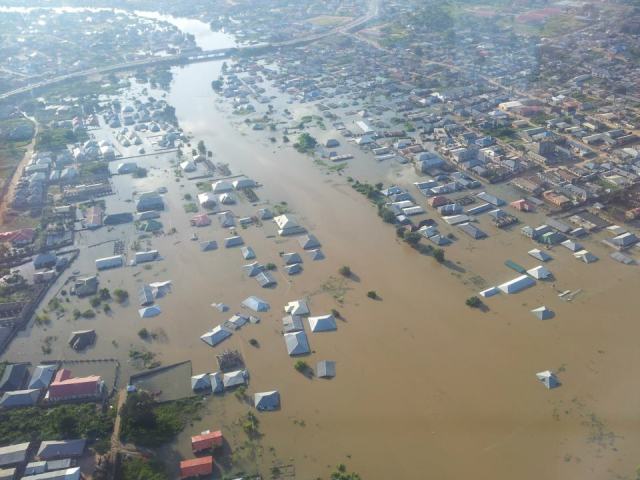Environmental and disaster management agencies at the federal and state levels have reactivated their panic buttons following the announcement by the Cameroonian authorities of the opening of the floodgate of Lagdo Dam.
States like Adamawa, Taraba, Benue, Nasarawa, Kogi, Anambra, Edo, Delta and Bayelsa are likely to be affected by the looming heavy flooding.
The ministry of foreign affairs, East and Central African Division, in the letter, said it received a note verbale from the high commission of the Republic of Cameroon indicating that Cameroon’s officials had resolved to open the flood gates of the Lagdo Dam on the Benue River.
The development, according to the letter addressed to the director general of the National Emergency Management Agency (NEMA), said it was due to increased rainfall in the dam’s catchment areas in Northern Cameroon.
The letter signed by Mr Umar Salisu on behalf of the permanent secretary, ministry of foreign affairs, urged NEMA to take all the necessary proactive steps and actions to mitigate the damage that the released water may cause along the River Benue basin in both Cameroon and Nigeria.
The letter entitled ‘Cameroonian officials to open the flood gates of the Lagdo Dam on the Benue River in Cameroon’ reads: “I have the honour to inform that the Ministry is in receipt of a Note Verbale from the High Commission of the Republic of Cameroon informing that Cameroonian officials have resolved to open the flood gates of the Lagdo Dam on the Benue River in days ahead due to the heavy rainfall around the Dam catchment area in Northern Cameroon.
“According to the Note, it is pertinent to note that when the release of water becomes necessary, the authorities of the Lagdo Dam will be releasing only modulated variable small amount of water at a time in order to mitigate and avoid damages that the released water may cause along the River Benue basin in both Cameroon and in Nigeria.
“In view of the above, it would be appreciated if the esteemed Agency takes all the necessary proactive steps and actions that will mitigate the damage as well as sensitize the populace living in such areas for vigilance and all necessary precautions.”
In its response, NEMA said it had taken actions to ensure minimum damage.
Spokesman for the agency, Mr Manzo Ezekiel, confirmed the receipt of the memo from ministry of foreign affairs.
“The National Emergency Management Agency (NEMA) wishes to allay fears of Nigerians over the planned released of the excess water from Lagdo dam, which is located on River Benue in the Republic of Cameroon.
“The Agency is working with critical stakeholders at the federal, states and local governments to ensure that the release will not cause much negative impacts on the low-lying communities along the states that would be affected.
“The states on the downstream of River Benue are Adamawa, Taraba, Benue, Nasarawa, Kogi, Anambra, Enugu, Edo, Delta, Rivers and Bayelsa states.
“From Kogi downstream to Delta State, if there’s an increase of water coming from Niger State, it means their own will be a bigger challenge.
“The primary states are the ones that are located along the river pathways, but the other ones are likely to be affected as a result of the effect of the water,” he said.
He said NEMA had alerted state governors of the possibility of flooding and that most of them had been responding positively by clearing blocked water channels and pathways that usually cause flash floods.
“The release of the water is a discrete action that the Lagdo Dam managers are facing. So, to some extent, it calls for concern.
“We’re not raising the red flag, but if the release of the water becomes more frequent, that is, more than what they are doing so far, and there is need for us to raise the red flag, we would do it. But for now, what we’re saying is that people should stay away from flood areas,” he said.
In Lagos, the permanent secretary, Lagos State Emergency Management Authority (LASEMA), Dr. Femi Oke-Osanyintolu, who reacted to the flood alert said the state government had prepared to promptly tackle any possible emergency that could arise from the impending flood.
He disclosed that the government had provided LASEMA with 144 units of facilities that could accommodate 5,000 internally displaced persons in the event of any emergency.
“Lagos is well prepared. As you can see, LASEMA has changed from management to holistic emergency management.
“What we mean here is that we have moved into the improved strategy of clearing canals and ensuring local governments have their local response, called environmental guard.
“The purpose is to ensure effective clearing of tertiary drainages and environmental gang clearing the secondary drainage, thereby complementing each other simultaneously.
“We have met with the 57 local government chairmen on the need to put all primary emergency responders on alert. We are fine-tuning and strengthening our local response mechanism.
“We have carried out risk analyses, resource mappings, opened directories in each council to know the vulnerable people in terms of emergency situation. All these measures are geared towards ensuring swift, prompt, and effective response.
“We are carrying out enlightenment and sensitization programmes to get residents prepared across the councils.
“The type of flood we have in Lagos called flash floods disappear within 30 minutes and one hour due to improved infrastructure and machinery in place. We are prepared,” he added.
In Benue, the government directed residents to vacate floodplains and evacuate blocked drainages.
The executive secretary of the State Emergency Management Agency (SEMA), Mr James Iorpuu, issued the order while reacting to the alert from the federal government.
The executive secretary who spoke through the agency’s head of administration, Mr. Donald Komgbebda, said SEMA was intensifying its awareness campaign to have ready the citizens impending flood.
“What we are doing now is to intensify the awareness campaign across the state to ensure that all those on flood plains vacate such areas.
“We also have plans to take steps to mitigate the affect of the flood on the people but for now the priority is to get the people to safer places.
“Though we also have contingency plans and we will not allow our people be subjected to untold hardship following the flood.
“All stakeholders in the matter will be mobilised to ensure that all hands are on deck to take actions to mitigate the impact of the impending flood,” he said.
In Delta State, the government said it had taken proactive steps to mitigate the effect of flooding in the state.
It also said it would set up IDP camps in the event of any severe flooding.
“We are already opening drainages and demolishing illegal structures blocking the waterways.
“We believe and hope that if we open up the drainages, it will help to reduce the effects of the flood. However, we advise those living in coastal communities to start moving to higher grounds.
“As it stands now, if need be, the state government will not hesitate to set up IDP camps for flood victims,” spokesman for the state governor, Mr Festus Ahon said in a statement.





























































